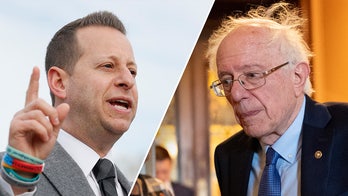Arne Duncan -- President-elect Barack Obama's longtime friend and head of the country's third largest school district -- has a reputation as a tough education reformer.
And the setting for Obama's announcement Tuesday that Duncan is his choice for education secretary was meant to make that case. The Dodge Renaissance Academy -- once a failing school on Chicago's West Side -- was reopened by Duncan, Chicago's public schools chief, in 2002. It is now a thriving academy for students from pre-kindergarten through eighth grade, and a training site for student teachers.
"When it comes to school reform, Arne is the most hands-on of hands-on practitioners," Obama said during his news conference.
Duncan, who met Obama on the basketball court nearly a decade ago and served as his closest education adviser during the presidential campaign, was relatively unknown in education circles until Chicago Mayor Richard M. Daley appointed him CEO of Chicago public schools in 2001.
As Chicago's education boss for seven years, Duncan, who attended Harvard University but has no degree in education, has been credited with boosting student test scores, raising the graduation rate by nearly 6 percent and creating 53 new public schools.
"In just seven years, he's boosted elementary test scores here in Chicago from 38 percent of students meeting the standards to 67 percent. The dropout rate has gone down every year he's been in charge," Obama said of Duncan.
But Duncan, 44, is not without controversy.
His positions -- including support for public boarding schools and teacher performance-based pay initiatives -- have generated criticism from some educators. His support for a program that pays students for earning good grades and his backing of a gay-friendly high school have also had a polarizing effect.
In trying to enforce higher standards for teachers and principals, Duncan has sometimes closed and reopened schools, forcing teachers to reapply for their jobs -- a move widely unpopular among some teachers' groups in Chicago.
Duncan is also a fervent supporter of "Renaissance 2010," a plan started by Daley in 2004 to close 500 failing schools permanently or to reopen them as reformed schools within six years.
In 2006, Duncan went on the offensive about the plan, accusing former domestic terrorist Williams Ayers -- now an education professor at the University of Illinois at Chicago and an Obama supporter -- for "failing to embrace" the program.
Ayers and his co-author Michael Klonsky responded to Duncan in an article published in Phi Delta Kappan -- a professional journal for education -- describing him as "the brightest and most dedicated schools leader Chicago has had in memory," but one who began his article by "admonishing us for failing to 'embrace' the board's Renaissance 2010 policy and instructs us on our responsibility to be 'impartial.'"
"People in power desire nothing more than obedience and easy agreement, but this is not the proper role for either reformers or scholars," they wrote.
Duncan then responded to Ayers and Klonsky in a rebuttal article, writing, "Rather than embrace Chicago's ambitious Renaissance 2010 program as a vehicle to advance school reform and the small schools movement while integrating greater accountability into the system, William Ayers and Michael Klonsky, pioneers in small school development, attack the initiative with inaccurate, misleading statements.
"Academics are supposed to stick to the facts and remain impartial, but Ayers and Klonsky have clearly failed the test," Duncan wrote.
Former Chicago public schools CEO Paul Vallas, who hired Duncan as his chief of staff in the mid-1990s, praised Duncan as a "bona fide school reformer" who is a "strong supporter of charter schools."
"His expansion of the number of charter schools in Chicago and his closing of a number of failing schools under Renaissance 2010 is clear testimony to that," Vallas told FOXNews.com.
"He pretty much had a cordial relationship with the union and was able to push very aggressive reforms without alienating union leaders or the rank and file," he said.
Vallas described Duncan as "unassuming" and "polite."
"He doesn't demagogue," said Vallas, adding that Duncan's "style, personality and temperament were well-suited for the job in Chicago and will be well-suited for his job as secretary of education."
Vallas said Duncan has called for more flexibility in the No Child Left Behind school accountability law, but does not plan to scrap the initiative entirely.
"He supports it, but wants to improve it," Vallas said.




